

Jonge Akademie verbaast zich over publicatietraditie. UTnieuws: 'Waarom mag ik niet eerste én laatste auteur zijn?' Ht">ik niet eerste én laatste auteur zijn?
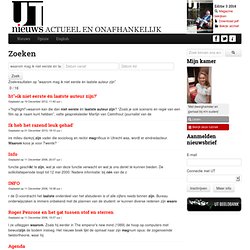
' Geplaatst op | ="highlight">waarom kan die dan niet eerste én laatste auteur zijn? “Zoals je ook scenario en regie van een film op je naam kunt hebben”, vatte gespreksleider Martijn van Calmthout (journalist van de Ik heb het razend leuk gehad' ire milieu dankzij zijn vader die socioloog en rector magnificus in Utrecht was, wordt er eindredacteur. Info functie geschikt te zijn, wat je van deze functie verwacht en wat je ons denkt te kunnen bieden. R de D-voordracht het laatste onderdeel van het afstuderen is of alle cijfers reeds binnen zijn. Roger Penrose en het gat tussen stof en sterren l ze uitleggen waarom. Agenda apollo@disc.utwente.nl. Ng met het `hoe' en `waarom' van toetsen en evalueren van onderwijs aan de hand van onderwijskundige principes. Rijhof Cultuurcentrum, beoordeelt de inzendingen. Algemeen Waarom begrijpen wij de oorlog niet? Raag waarom Spinoza's denken bij zijn tijdgenoten zoveel weerstand opriep.
Ds een tweede natuur. (KNAW) DISCUSSIEBIJEENKOMST: KENNIS OVER PUBLICEREN. Elsevier editorial system hacked, reviews faked, 11 retractions follow. For several months now, we’ve been reporting on variations on a theme: Authors submitting fake email addresses for potential peer reviewers, to ensure positive reviews.
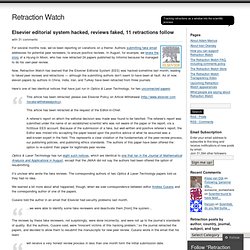
In August, for example, we broke the story of a Hyung-In Moon, who has now retracted 24 papers published by Informa because he managed to do his own peer review. Now, Retraction Watch has learned that the Elsevier Editorial System (EES) was hacked sometime last month, leading to faked peer reviews and retractions — although the submitting authors don’t seem to have been at fault. As of now, eleven papers by authors in China, India, Iran, and Turkey have been retracted from three journals. Here’s one of two identical notices that have just run in Optics & Laser Technology, for two unconnected papers: It’s unclear who wrote the fake reviews. We learned a bit more about what happened, though, when we saw correspondence between editor Andrea Cusano and the corresponding author of one of the papers.
Update, 2:10 p.m. Elsevier: Faking peer reviews. Yesterday, Ivan Oransky of Retraction Watch reported that Elsevier Editorial System (EES), our online platform for managing the submission and peer-review process, had been hacked in November.
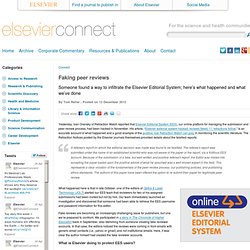
His article, “Elsevier editorial system hacked, reviews faked, 11 retractions follow,” is an accurate account of what happened and a good example of the positive role Retraction Watch can play in monitoring the scientific literature. The Retraction Notices posted by the Elsevier journals themselves provided details about the falsified reports: A referee's report on which the editorial decision was made was found to be falsified. The referee's report was submitted under the name of an established scientist who was not aware of the paper or the report, via a fictitious EES account. Because of the submission of a fake, but well-written and positive referee's report, the Editor was misled into accepting the paper based upon the positive advice of what he assumed was a well-known expert in the field.
Researcher faked email addresses so he could review his own studies. Hyung-In Moon Scientists frustrated by the so-called “third reviewer” — the one always asking for additional experiments before recommending acceptance — might be forgiven for having fantasies of being able to review their own papers.
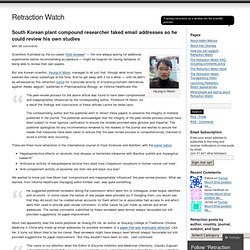
But one Korean scientist, Hyung-In Moon, managed to do just that, through what must have seemed like clever subterfuge at the time. And he got away with it for a while — until he didn’t, as witnessed by this retraction notice for “Larvicidal activity of 4-hydroxycoumarin derivatives against Aedes aegypti,” published in Pharmaceutical Biology, an Informa Healthcare title: The peer-review process for the above article was found to have been compromised and inappropriately influenced by the corresponding author, Professor HI Moon. As a result the findings and conclusions of these articles cannot be relied upon.The corresponding author and the publisher wish to retract these papers to preserve the integrity of material published in the journal.
Fake Peer Reviews, the Latest Form of Scientific Fraud, Fool Journals - Publishing. September 30, 2012 Suspicions that Hyung-In Moon, a professor at Dong-A U., in South Korea, wrote his own peer reviews have prompted several journals to retract his papers.
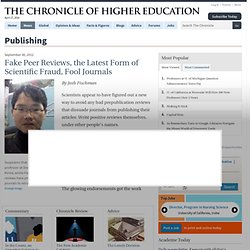
Enlarge Image By Josh Fischman Scientists appear to have figured out a new way to avoid any bad prepublication reviews that dissuade journals from publishing their articles: Write positive reviews themselves, under other people's names. In incidents involving four scientists—the latest case coming to light two weeks ago—journal editors say authors got to critique their own papers by suggesting reviewers with contact e-mails that actually went to themselves. The glowing endorsements got the work.
How is Elsevier promoting ethical publishing? A guest post. As Retraction Watch readers know, we cover Elsevier’s journals frequently, including a story just last week about their peer review system being hacked.
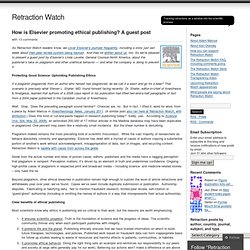
And they’ve written about us, too. So we’re pleased to present a guest post by Elsevier’s Linda Lavelle, General Counsel-North America, about the publisher’s take on plagiarism and other unethical behavior — and what the company is doing to prevent it. Protecting Good Science: Upholding Publishing Ethics If a plagiarist plagiarizes from an author who herself has plagiarized, do we call it a wash and go for a beer?
That scenario is precisely what Steven L.